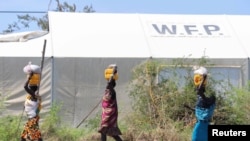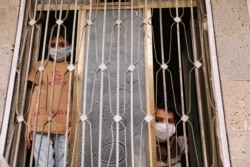The World Food Program warns the COVID-19 pandemic threatens to boost the number of hungry people in the Middle East and North African region to more than 47 million, an increase of more than 6.7 million from current figures.
This region has been mired in conflict, political instability and economic problems for years. COVID-19 is compounding these difficulties. U.N. agencies warn fragile and dysfunctional governments in the Middle East and North Africa are ill-equipped to deal with the pandemic and its impact.
The World Food Program’s Global Report on Food Crises notes 20 percent of people around the world suffering from acute food shortages are to be found in the Middle East.
WFP spokeswoman, Elisabeth Byrs said the report predicts the pandemic will increase extreme hunger and that many more people in the region will struggle to feed themselves as their means of livelihood disappear.
“With little to no savings, no unemployment insurance, and reduced food subsidies, people who engage in subsistence or informal work to support their families cannot endure sustained lockdowns. Many of the people receiving food assistance rely on it for their survival,” she said.
The World Food Program currently provides food to 23 million people in the region. More than two thirds of this assistance is being channeled to people in Yemen and Syria who have been wracked by war, illness and hunger for years.
WFP reports nearly 3.8 million children in 11 countries are no longer receiving school meals following school closures across the region, depriving most of the children of their only nutritious meal of the day.
The U.N food agency says it is finding alternative ways to make up for these missed meals in nine of the 11 countries. These include the provision of take-home rations and home delivery of food. In some cases, WFP provides families with cash or vouchers they can use to buy food in local markets.





